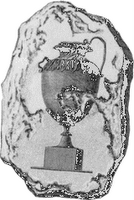 Genre analysis. Perhaps this is the criterion of greatness in literature: works which transcend their genre are those which are truly great. Most of the great novels seem to use their genre as some sort of sounding board and then spin out from there in ever widening circles; or they take several genres and conflate them. Two alternatives. Either this means that genre studies are an inadequate way of looking at the problem: the perfectly delineated work within the boundaries of one clean genre perhaps does not exist except as a theoretical model (I suspect this may be so); or it has vanished from the canon, sunk into obscurity by the purity of its own bloodline. The novel is an inherently omnivorous genre, devouring all other genres to create a mix, a vacuum which sucks everything in of necessity according to the logic of its own rules.
Genre analysis. Perhaps this is the criterion of greatness in literature: works which transcend their genre are those which are truly great. Most of the great novels seem to use their genre as some sort of sounding board and then spin out from there in ever widening circles; or they take several genres and conflate them. Two alternatives. Either this means that genre studies are an inadequate way of looking at the problem: the perfectly delineated work within the boundaries of one clean genre perhaps does not exist except as a theoretical model (I suspect this may be so); or it has vanished from the canon, sunk into obscurity by the purity of its own bloodline. The novel is an inherently omnivorous genre, devouring all other genres to create a mix, a vacuum which sucks everything in of necessity according to the logic of its own rules.
Sunday, August 13, 2006
Fragment 122
 Genre analysis. Perhaps this is the criterion of greatness in literature: works which transcend their genre are those which are truly great. Most of the great novels seem to use their genre as some sort of sounding board and then spin out from there in ever widening circles; or they take several genres and conflate them. Two alternatives. Either this means that genre studies are an inadequate way of looking at the problem: the perfectly delineated work within the boundaries of one clean genre perhaps does not exist except as a theoretical model (I suspect this may be so); or it has vanished from the canon, sunk into obscurity by the purity of its own bloodline. The novel is an inherently omnivorous genre, devouring all other genres to create a mix, a vacuum which sucks everything in of necessity according to the logic of its own rules.
Genre analysis. Perhaps this is the criterion of greatness in literature: works which transcend their genre are those which are truly great. Most of the great novels seem to use their genre as some sort of sounding board and then spin out from there in ever widening circles; or they take several genres and conflate them. Two alternatives. Either this means that genre studies are an inadequate way of looking at the problem: the perfectly delineated work within the boundaries of one clean genre perhaps does not exist except as a theoretical model (I suspect this may be so); or it has vanished from the canon, sunk into obscurity by the purity of its own bloodline. The novel is an inherently omnivorous genre, devouring all other genres to create a mix, a vacuum which sucks everything in of necessity according to the logic of its own rules.
Subscribe to:
Post Comments (Atom)
2 comments:
One great genre-busting novel: Ursula K. LeGuin's The Left Hand of Darkness. A work of science fiction, which must be one of the most marginalised genre's currently in play, yet one which with a fair degree of regularity produces exceptional novels that are both entertainingly good reads and stout-hearted literary texts. Not to mention that Sci-fi as a genre has that all important element of the creative equation: an active, engaged, broad and unselfconscious audience.
Another marginalised genre, which also has all the characteristics you mention, is the historical novel. Why is the great Dorothy Dunnett not regarded with the same seriousness as say, McEwan or Amis?
Post a Comment